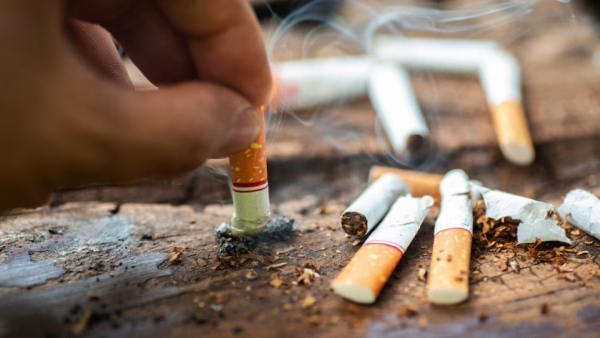Is social smoking bad for you?
Even smoking occasionally is damaging your health


It’s Friday night. You’ve clocked out of work for another week, and you’re down at the pub, having a few drinks with your mates to celebrate the start of another weekend. Someone pulls out a packet of cigarettes and offers them around. If you’re an occasional smoker or a social smoker, it might be difficult to say no. And hey, how much harm can social smoking really do anyway?
As it turns out, a lot. While many social smokers think that they’re not doing damage because they aren’t smoking every day, the fact is, every cigarette you smoke is doing you damage.
“If you’re smoking any number of cigarettes, you’re doing yourself harm,” says Dr Hamish Black, nib group medical advisor. “You’re kidding yourself if you think that just having a few cigarettes with your friends is fine for your health.”
What is social smoking?
So you don’t smoke on a daily basis. Perhaps you’ve never even bought yourself a packet of cigarettes. But even if you only light up when you’re hanging out with friends or drinking, you’re still an occasional smoker – though chances are you don’t identify yourself that way.
Smoking only when you’re out with friends or in groups is known as social smoking and is often triggered by alcohol – that is, drinking becomes psychologically connected with smoking, making you crave a cigarette when alcohol is involved.
But while a couple of cigarettes on the weekend might seem less harmful than a pack-a-day habit, even smoking occasionally is damaging your health.
“There’s nothing healthy about social smoking,” says Hamish. “People think, ‘Oh, this isn’t harmful, I’m just having one cigarette.’ But the problem is, this is just a way of trying to justify something that really is unhealthy in any amount.”
Related: 9 reasons to quit smoking today
Health effects of social smoking
Even the occasional smoker is opening themselves up to both immediate and long-term increased health risks, such as heart disease, lung cancer, cataracts and many other smoking-related conditions.
According to Quit.org.au, smoking just one to four cigarettes a day almost triples your risk of dying from heart disease or lung cancer, while light and intermittent smokers have almost the same risk of cardiovascular disease as people who smoke daily. Those are some pretty astonishing facts.
Additionally, males who engage in social smoking are 60% more likely to die earlier than non-smoking males, while female occasional smokers lose, on average, four to six years of their life compared to non-smoking females.
“As you can see, there’s not a lot of good in social smoking,” says Hamish. “All of those stats are really scary, and the risks drop off substantially once you get to zero cigarettes – but even one a day is a significant risk.”
So while technically, smoking fewer cigarettes less often is potentially less harmful than smoking, for example, a pack a day, there’s no amount of cigarettes you can safely smoke.
Related: How I successfully quit: Three ex-smokers share their stories
Breaking the social smoking habit
No matter how many cigarettes you smoke, quitting is the best thing you can do for your health.
“I think the first thing is to acknowledge that it’s not easy to stop smoking, and that includes social smoking,” says Hamish, who says the resources available to help people quit these days are excellent. “Things like Quitline are really useful, and talking to your doctor is important as there may be medicines that can help you.”
The social aspect may also make smoking with friends difficult to give up.
“If you’re a social smoker, you get used to the benefits of socialising, and the cigarette goes with that, so you could be wondering whether you’re going to lose friends as a result.”
Tell your friends beforehand that you’re planning to stop, he advises.
“Some may say they’ll help you, or quit with you, or at the very least won’t smoke around you.”
And if you have unhelpful friends who try to undermine your efforts?
“Being around those people is obviously not going to help you, so there might be a period of time where you just can’t socialise with them while you’re quitting,” he advises.
Related: 8 ways e-cigarettes are worse for your health than you think

Other tips to quit social smoking
Limit your alcohol intake
Because social smoking is often triggered by alcohol, it can help to limit or avoid drinking at social gatherings.
Socialise with non-smoking friends
Making plans to hang with non-smoking friends will help to reduce temptation.
Choose non-smoking venues
Book in dinners, nights out or activities in non-smoking venues to help curb the desire to smoke.
Find a replacement
When you’re out, find something to do instead of smoking – try chewing gum or sucking on a sugar-free lolly instead – and look for other ways to keep your hands busy: think, worry beads, squeezing a stress ball, playing with a bracelet or watch, or flipping a coin.
Make a plan
Above all, remember that quitting smoking is difficult, even for the occasional smoker, and coming up with a quit plan before you embark on the journey can help.
“It’s important to have these strategies in place before you go to the situations that trigger you,” says Hamish.
Ready to quit social smoking?
If your goal is to give up smoking, we want to help you achieve it; that’s why we offer Extras covers that include benefits for nicotine replacement therapies that are ordered by your GP, including gum, patches, inhalers and lozenges. The aim of these therapies is to help you quit by replacing some of the addictive nicotine you’d normally get through a cigarette to help ease the withdrawal symptoms.
If you’re not with nib, but you’d like to find out more about our cover options, get a quote today or contact our award-winning member service team on 13 16 42.
For coping strategies and quitting methods, visit quitnow.gov.au or call the Quitline on 13 78 48.
Please note: The tips throughout this article serve as broad information and should not replace any advice you have been given by your medical practitioner.
Getting headaches? Here’s what you need to know about eye strain
Here are some tips on relieving your eye strain symptom from an optometrist.
8 healthy habits to start in your 30s
It's the perfect time to lay the foundations of good health
8 ways to keep healthy in your 40s
Ditch the diet and start making some simple life changes
Dr Hamish Black
Dr Hamish Black has been a medical practitioner for more than 25 years. In addition to his role as nib group medical advisor, he still spends two days a week practising as a GP. He has spent many years working in emergency departments and in rural Australia, including a stint with the Royal Flying Doctor Service. Hamish also loves karaoke and dancing (though not that well at either, he says!), with Play that Funky Music by Wild Cherry being his karaoke favourite.





